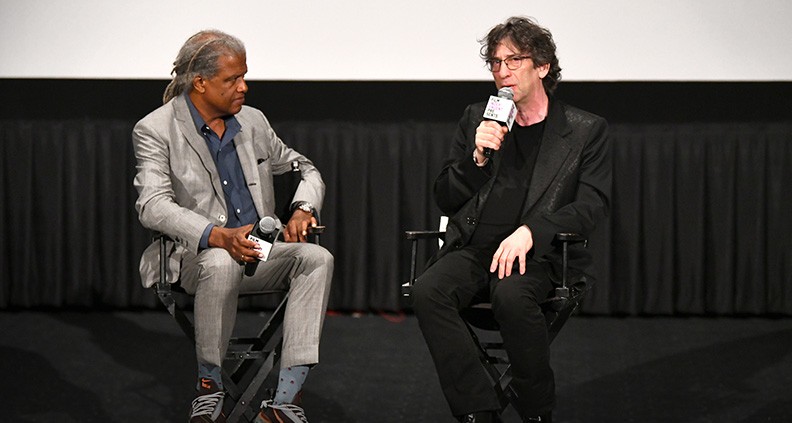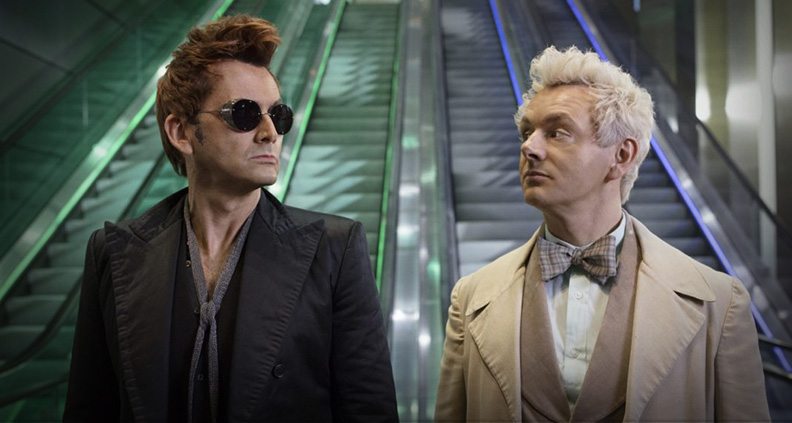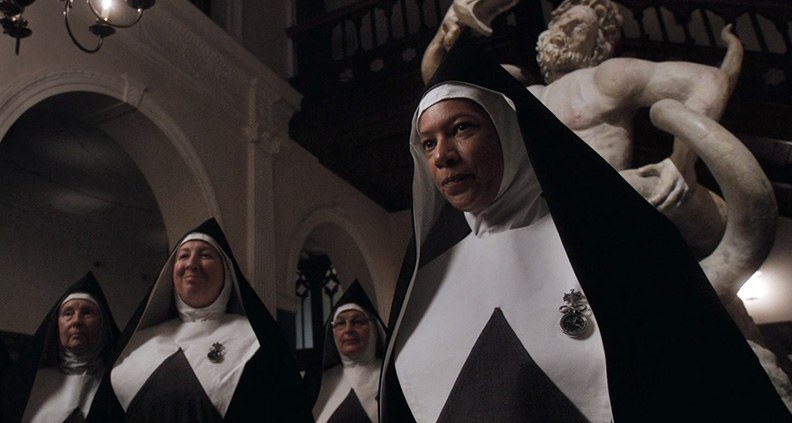The pilot introduces audiences to the birth of the world (a Libra, it turns out) and two immortal beings present from the very beginning of time: an angel named Aziraphale (Sheen) and a demon named Crowley (Tennant.) As the struggle between the two rivals continues, the world nears its end as the literal antichrist is born in modern day Britain. Armageddon is coming—and with it, all of the worldly pleasures these two otherworldly beings have come to enjoy. With truly classic British sense of humor, our heroes set about frustrating the world’s end in an effort to prolong its life—and their own. But the unlikely partnership is not without its setbacks. Gaiman admitted that, while narration can sometimes be a drag when it comes to dramatic storytelling, in this case he realized it was imperative. When the BBC adapted the book for a radio drama in 2014, “it was like watching someone walking ahead of you through a field with landmines,” he said. “[Radio director] Dirk Maggs made a choice [not to use narration]—and had I not seen it, I would have made that same choice. To tell the story without a narrator.” But, Gaiman said, “the thing I missed more than anything else [was] the voice of the book. I didn’t have anyone commenting on things. That voice adds color and texture that somehow makes it fly.” Gaiman was up to his eyeballs in drafts of The Sandman comic book in the late ‘80s when the Good Omens journey began, with a call from colleague Terry Pratchett (who died in 2015.) The two writers had discussed an early version of the story when, as Gaiman recounted, Pratchett said to him: “I’ve been thinking about that story idea you told me. I think we should either work on it together or you should give it to me—I know what happens next.” In that moment, Gaiman said, the call felt fated. “I knew this was a lot like Michelangelo phoning you up and saying, ‘Do you want to do a ceiling this weekend?’” he said. According to Gaiman, the “voice” of the book version of Good Omens reflects a value recognized from authors who had influenced Gaiman as he built his own authorial voice. Authors Douglas Adams (Hitchhiker’s Guide to the Galaxy), P.L. Travers (Mary Poppins) and Roger Zelazney (The Amber Chronicles) all helped Gaiman develop his own blend of fantasy, timing and turn of phrase. “I was a kid who was saved by books,” Gaiman said. “The world was a confusing and dangerous place. Books made sense; they helped explain things like the complicated adult world. It left me with a love of narrators—unreliable narrators I can really connect to,” he said. Mitchell commented that the new Good Omens script deftly manages not to turn its characters—though stylized—into caricatures. That reserved style proved surprisingly difficult to convey when it came to casting, said Gaiman. But as Mitchell pointed out: “You don’t write archetypes. You can feel the humor and the life in the story.” Yet initial auditions went, to quote Gaiman, “Horribly, horribly, horribly wrong. Everything about them was wrong.” That wrongness mystified Gaiman and director Mackinnon. Then Nina Sosanya—who plays Sister Mary Loquacious—came in. “Nina was perfect,” Gaiman reflected. “Her favorite book had been Good Omens, she reads it once a year. The penny dropped. I sent an email to the casting director.” Once people knew to treat the characters seriously rather than trying to be comedic, everything worked. “You have to trust the material makes it funny. The more seriously the actors treat it, the funnier, but also the more emotional heft it has.” https://www.youtube.com/watch?v=hUJoR4vlIIs The adaptation process for Gaiman was an exercise in trusting his own source material. Trusting his own instincts (and the instincts of his circa-1990 self) resulted not only confidence in the story he and Pratchett had already built, but also the story he, Mackinnon and their cast and crew were going to tell. Said Gailman: “A [publisher] thinks that they’re buying a story. But they’re never buying a story; they’re buying the way it’s told. Authors are not selling a story. They’re selling the way it’s told.”
Upcoming Film Independent events…
Free Screening: Plus One (ArcLight Cinemas Hollywood, conversation with actors Maya Erskine and Jack Qaid with directors Jeff Chan and Andrew Rhymer) June 4 Arab Cinema Series: The Nightingale’s Prayer (Film Independent Offices, 5670 Wilshire Blvd. 9th Floor) June 4 Free Members Only Screening: PEN15 (ArcLight Cinemas Hollywood, conversation with creators Maya Erskine & Anna Konkle) June 10


